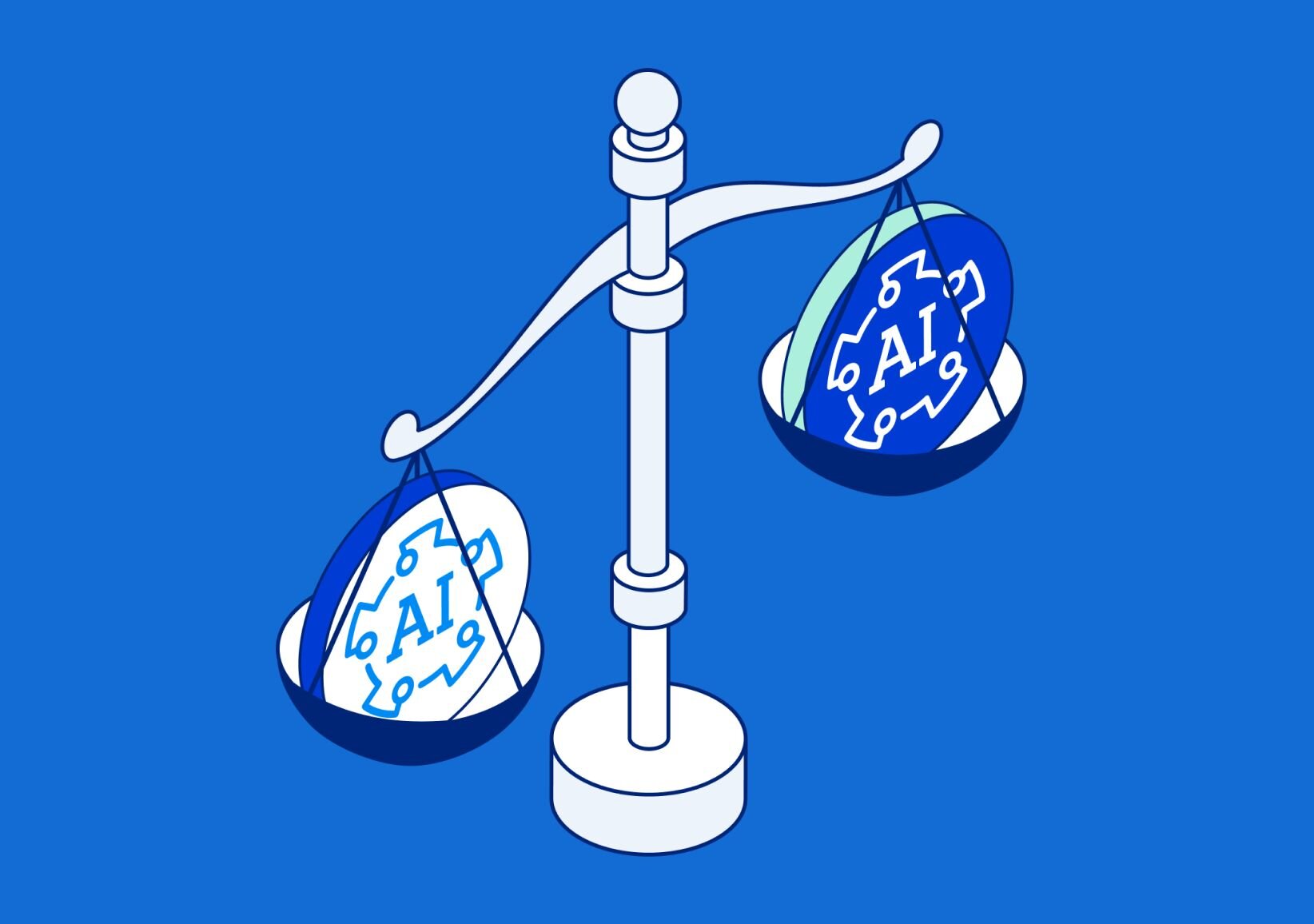It’s been less than two years since ChatGPT made Artificial Intelligence (AI) mainstream, but in that time the number of incredibly powerful and innovative AI tools have exploded. Now, the discussion about whether AI is good or bad for society has jumped from the pages of science fiction novels to news rooms and office water coolers.
For small businesses, the question of whether to use AI is practical, not philosophical, when trying to make the most out of budgets and find a competitive edge. Many small business leaders are excited to discover what’s possible now and are making AI part of their long-term growth. But at the same time, many are proceeding with caution, unsure whether AI is the right fit for their company’s strategy and brand.
To help you determine whether using AI is right for your business, let’s take a look at some of the pros and cons of AI for small businesses.
The pros and cons of AI for small businesses
The ultimate question for adopting any new technology, including AI, is whether the benefits outweigh the risks and the cost to invest. A recent survey from the Small Business & Entrepreneurship Council found that 75% of surveyed small businesses used AI tools, with adoption rates increasing as revenue increased. On average, the businesses surveyed used four AI tools.
While those numbers have risen dramatically compared to past years, only 54% of those businesses planned to increase AI investments over the next year. So, what’s holding them back from adding new tools and finding new use cases for AI? Let’s take a look at common concerns and how the pros might outweigh the cons.
Con #1: AI is impersonal
For small businesses, where the personal touch is often what sets a company apart from the competition, the prospect of handing over content creation or customer interactions to AI can feel daunting. While an AI-powered chatbot might be more efficient than a human in a call center, you also don’t want customers to feel like you’ve delegated customer service to a robot.
Pro #1: AI can improve the customer experience and give you a competitive advantage
Worries over AI making customer interactions feel impersonal are valid, but
there are ways to deploy AI that can actually enhance the customer experience
and by doing so, give your business an advantage over your competitors.
Leveraging AI’s strengths with a human touch can make a huge difference. With CallRail’s AI-powered Premium Conversation Intelligence™, which transcribes, summarizes, and analyzes the sentiment of each call, you can quickly assess your customers’ needs and concerns and respond appropriately with a human touch. With those insights, you can make better decisions that improve the customer experience, improve marketing efforts, and provide staff training that directly addresses real customer needs.
Con #2: AI will take people’s jobs
AI can often be positioned as a replacement for certain jobs held by actual people. It’s little surprise that 36% of full-time and part-time workers in the US are worried AI will take their jobs. As a pillar of your community, the last thing you want is for new AI-powered tools to be perceived as a threat to employees’ jobs. .
Pro #2: AI helps people do their job better
While there are many sci-fi takes on a future where AI runs the world, the reality is that many workers are frustrated by repetitive tasks and want solutions that boost productivity. Pairing the right AI tool for roles with repetitive tasks can be a win for workers and businesses.
For example, keeping up with industry and customer trends is important for marketers to improve messaging and campaigns. An AI-powered tool analyzing conversations and providing call highlights can help small business marketers identify keyword and Google Ad opportunities so they can focus on implementing the most successful marketing strategy, rather than listening to hours of call recordings.
Con #3: AI is too complicated to use
Let’s face it: new technology is risky, and for small businesses, risk is scary. For AI, some of the risk comes from its perceived complexity.There’s the practical challenge of identifying the right use cases for your business, selecting the right tools, training your staff, and changing workflows. Figuring this out takes time and money. And, if there aren’t clear use cases and ROI attached, the long-term benefits may not be worth the short-term impact to business.
Pro #3: AI saves time and money
Compared to many technologies, AI tools are often intuitive and only require you to learn a few simple things like writing prompts, refining prompts, reviewing reports, etc. Focus on AI solutions that take care of time-intensive tasks to free up time for innovation. With the right use cases and tools, AI can help solve complexity without adding complexity.
Small business owners reported they saved 13 hours a week themselves, while also redirecting employees to focus on higher-value work and investing in new solutions, equipment, and technology to improve customer engagement and retention. With Conversation Intelligence®, companies spend 60% less time analyzing calls each week, and they’re using that time to train agents better, focus on revenue-driving tasks, and improve the customer experience.
Con #4: AI marketing can hurt your brand
Many companies are excited to use GenAI tools to accelerate creative marketing efforts, like social media image creation and article writing. But consumers are less excited. In fact, consumers are more likely to say that the use of AI makes them distrusting (40%), rather than trusting (19%), of a brand. For small businesses, where consumer trust and brand loyalty help them compete against their bigger competitors, there is caution and hesitancy around using GenAI in marketing.
Pro #4: AI helps make marketing better
While uncanny AI images shared on social media can be bad brand marketing, there are many ways AI can elevate your marketing efforts without impacting the brand perception.
That’s because time, money, and people-power are always in short supply when it comes to marketing any small business. Those are the three key ingredients needed to build a marketing strategy that can lift the company over the competition. From uncovering insights to make better campaigns and maximizing the value of each marketing dollar spent to increasing lead conversion rates and decreasing customer churn, AI is going to help you tackle these problems, faster and cheaper than ever.
At CallRail, we’re using AI to tackle complex challenges like multi-conversation insights. CallRail can give marketers instant access to a 3-6 sentence summary for each call, average sentiments and notable trends behind positive and negative interactions, plus commonly asked questions to help drive messaging and keyword decisions. Such analysis would take hours and hours for marketing teams, but CallRail makes improving marketing attribution and customer experiences effortless.
Con #5: AI’s lack of transparency
There are many ethical and legal challenges surrounding AI: are their biases in the algorithms that will unknowingly affect decisions? Will using AI to generate content cross copyright laws? Will skeptical customers have privacy concerns if my brand uses AI tools?
In certain use cases or industries, like health care and finance, safety concerns and regulations make black box models a risky choice for critical tasks. Furthermore, the open source nature of popular GenAI models means using sensitive corporate or personal customer data might result in that data being exposed to competitors.
Pro #5: AI enriches your data
While there are valid concerns about how AI’s algorithms make decisions and privacy concerns around data, most companies struggled with transparency into how their data was being stored and used prior to AI, anyways. In fact, AI is helping solve two of the biggest problems every company—even small ones—has faced in the digital age: there’s too much data and no way to use it all. That combination can lead to higher costs for data storage and increase compliance and privacy risks.
AI can help you use more data and make it more valuable by enriching datasets. For example, our CallRail Labs team is helping marketers remove their blind spots by using AI to analyze the entire customer dataset and remove any attribution assumptions.
AI can also be used to “enrich” data by protecting it. With CallRail, for example, we know how important it is for healthcare companies to keep Protected Health Information (PHI) secure, which is why our AI-powered Healthcare Plan automatically redacts sensitive patient-protected health information from call transcripts. For companies complying with the Payment Card Industry Data Security Standard (PCI DSS), CallRail can also help keep payment information out of call transcripts.
Let CallRail weigh AI’s pros and cons for you
If you’re still worried about using AI in your business, start with a trusted solution like CallRail that has proven ROI for AI-powered tools and commitment to responsible AI development. You can talk to CallRail’s experts or test the product out for yourself with a 14-day free trial.











